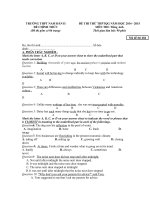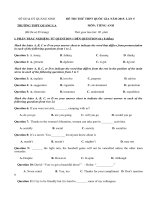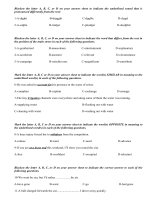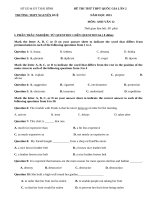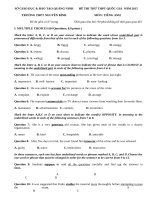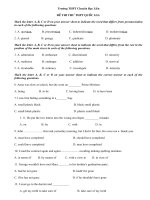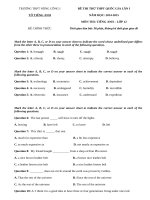- Trang chủ >>
- THPT Quốc Gia >>
- Ngoại Ngữ
ĐỀ THI THỬ THPTQG NĂM 2015 TRƯỜNG THPT NAM ĐÀN 2
Bạn đang xem bản rút gọn của tài liệu. Xem và tải ngay bản đầy đủ của tài liệu tại đây (347.61 KB, 10 trang )
TRƯỜNG THPT NAM ĐÀN II
ĐỀ CHÍNH THỨC
(Đề thi gồm có 06 trang)
ĐỀ THI THỬ THPTQG NĂM HỌC 2014 - 2015
MÔN THI: Tiếng Anh
Thời gian làm bài: 90 phút
Mã đề thi 684
Họ, tên thí sinh: Số báo
danh:
A. PHÇN TR¾C NGHIÖM .
Mark the letter A, B, C, or D on your answer sheet to show the underlined part that
needs correction
Question 1: Building thousands of years ago, the ancient palace is popular with modern
tourists
A B C D
Question 2: Social will be having to change radically to keep face with the technology
available .
A B C
D
Question 3: There are differences and simillarities between Vietnamse and American
culture .
A B C
D
Question 4: Unlike many writings of her time , she was not preoccupied with morality .
A B C D
Question 5: Daisy has such many things to do that she has to no time to go out .
A B C D
Mark the letter A, B, C, or D on your answer sheet to indicate the word or phrase that
is CLOSEST in meaning to the underlined part in each of the followings.
Question6: The dog saw his reflection in the pool of water .
A. imagination B. bone C. leash D.
image
Question7: Few businesses are flourishing in the present economic climate.
A. taking off B. setting up C. growing well D. closing
down
Question 8: At times, I look at him and wonder what is going on in his mind.
A. hardly B. always C. sometimes D.
never
Question9: The noise next door did not stop until after midnight.
A. Not until after midnight the noise next door stopped.
B. It was midnight and the noise next door stopped.
C. The noise next door stopped at midnight
D. It was not until after midnight that the noise next door stopped
Question 10: "Why don't you ask your parents for advice?" said Tom.
A. Tom suggested to me that I ask my parents for advice
B. Tom advised me asking my parents for advice.
C. Tom wanted to know the reason why I don't ask my parents for advice.
D. Tom told me to ask my parents for advice.
Mark the letter A, B, C or D on your answer sheet to indicate the correct answer to
each of the following questions.
Question 11: If the current rate of deforestation continues, the world’s rainforests
___within 100 year
A. would vanish B. vanish C. will vanish D. would have
vanished
Question12: Who was the last one ______the classroom yesterday?
A. to leave B. left C. leaving D. had left
Question 13: Peter was ejected after committing five personal ______ in water sport
game yesterday.
A. mistakes B. faults C. fouls D. errors
Question 14: It was announced that neither the passengers nor the driver _________in the
crash.
A. are injured B. was injured C. were injured D. have been injured
Question 15 : ____the laser beam is very thin, it is intense enough to drill through the
most delicate bones.
A. When B. While C. Since D. Although
Question16:Deborah is going to take extra lessons to_____ what she missed while she
was away.
A. catch up on B. cut down on C. take up with D. put up
with
Question 17: At first she was trained to be ____scriptwriter, but later she worked as ____
secretary.
A. the / a B. a / a C. the / the D. a / the
Question 18: Today, women are increasingly involved ________ the politics.
A. of B. in C. with D. from
Question 19: The more she practices, ____ she becomes.
A. the most confident B. the more confident
C. the greater confidence D. more confidently
Question 20: It is______ work of art that everyone wants to have a look at it.
A. a so unusual B. so an anusual C. such unusual a D. such an
unusual
Question 21: We decided to take a late flight _______ we could spend more time with
our family.
A. in order B. so as to C. in order to D. so that
Question 22: No one can avoid______ by advertisements.
A. having influenced B. being influenced
C. to be influenced D. influencing
Question 23: ____ your help, I wouldn’t have got the scholarship.
A. If I had had B. Had not it been for C. But for D.
Unless I had
Question 24: He was ______ speaker!
A. so good a B. what a good C. so a good D. how good a
Question 25: Working as a volunteer gives her a chance to develop her interpersonal
skills, promote friendship, and______ her own talent.
A. discovering B. to discover C. discover D.
discovered
Question 26: The restaurants on the island are expensive, so it’s worth______ packed
lunch.
A. taken B. taking C. to take D. take
Question 27: Anne: “Thanks for the nice gift!”
John: “______”
A. In fact, I myself don’t like it. B. You’re welcomed.
C. I’m glad you like it. D. But do you know how much it costs?
Question 28: He thinks you are _________ your time looking for a job in this town.
There’s not much to do here.
A. wasting B. missing C. losing D.
spending
Question29: Peter asked me ______.
A. what time does the film start B. what time the film starts
C. what time the film started D. what time did the film start
passage and mark the letter A, B, C, or D on your answer sheet to indicate the correct
word for each of the blanks from 1 to 10
Everyone wants to reduce pollution . But the pollution problem is ( 30 ) ……………
complicated as it is serious . It is complited 31 ) …………… much pollution is caused by
things that benefit people . ( 32)………. , exhaust from automobiles causes a lartge
percentage of air pollution . But the automobile (33 ) … transportation for millions of
people . Factories discharge much (34)……. The material that pollutes theair and water ,
but factories give employment to a large munber of people . Thus , to end (35)………
greatly reduce pollution immediately , people would have to ( 36) … using many things
that benefit them . Most of the people do not want to do that , of course . But pollution
can be ( 37) … reduced in several ways . Scientists and engineers can work to find ways
lessen the (38) ………. Of the pollution that such things as automobiles and factories
cause . Governments can pass and enforce laws that (39) ……….businesses and traffic to
stop , or to cut down on certain polluting activities .
Question 30. A. less B. like C. as D. more
Question 31. A. while B. because C. so D. though
Question 32. A. like B. such as C. specific D. For example
Question 33. A. provides B. takes C. carries D. affords
Question 34.A. of B. about C. with D. for
Question 35. A. or B. and C. as well D. then
Question 36. A. stop B. go on C. start D. continue
Question 37. A. carefully B. unexpectedly C. gradually D. little
Question 38. A. number B. way C. figure D. amount
Question 39. A. request B. forbid C. prevent D. require
Mark the letter A, B, C or D on your answer sheet to indicate the word which is
stressed differently from that of the rest in each of the following questions.
Question 40: A. considerate B. photographer C. community D.
circumstance
Question 41: A. apply B. anthem C. appear D. attend
Question 42: A. prevent B. recent C. receive D.
remote
Mark the letter A, B, C or D on your answer sheet to indicate the word which is
stressed differently from that of the rest in each of the following questions.
Question 43: A. ruined B. crowded C. admired D.
strolled
Question 44: A. important B. attraction C. character D.
irrational
Read the following passage, and mark the letter A, B, C, or D on your answer sheet to
indicate the correct answer to each of the questions from 45. to 54.
Traditionally in America, helping the poor was a matter for private charities or local
governments. Arriving immigrants depended mainly on predecessors from their
homeland to help them start a new life. In the late 19th and early 20th centuries, several
European nations instituted public-welfare programs. But such a movement was slow to
take hold in the United States because the rapid pace of industrialization and the ready
availability of farmland seemed to confirm the belief that anyone who was willing to
work could find a job.
Most of the programs started during the Depression era were temporary relief measures,
but one of the programs Social Security - has become an American institution. Paid for
by deductions from the paychecks of working people, Social Security ensures that retired
persons receive a modest monthly income and also provides unemployment insurance,
disability insurance, and other assistance to those who need it. Social Security payments
to retired persons can start at age 62, but many wait until age 65, when the payments are
slightly higher. Recently, there has been concern that the Social Security fund may not
have enough money to fulfill its obligations in the 21st century, when the population of
elderly Americans is expected to increase dramatically. Policy makers have proposed
various ways to make up the anticipated deficit, but a long-term solution is still being
debated.
In the years since Roosevelt, other American presidents have established assistance
programs. These include Medicaid and Medicare; food stamps, certificates that people
can use to purchase food; and public housing which is built at federal expense and made
available to persons on low incomes.
Needy Americans can also turn to sources other than the government for help. A broad
spectrum of private charities and voluntary organizations is available. Volunteerism is on
the rise in the United States, especially among retired persons. It is estimated that almost
50 percent of Americans over age 18 do volunteer work, and nearly 75 percent of U.S.
households contribute money to charity.
Question 45: New immigrants to the U.S. could seek help from ______.
A. the people who came earlier B. the US government agencies
C. only charity organizations D. volunteer organizations
Question 46: It took welfare programs a long time to gain a foothold in the U.S. due to
the fast growth of______.
A. industrialization B. modernization C. urbanization D. population
Question 47: The word “instituted” in the first paragraph mostly means ______.
A. “executed” B. “studied” C. “introduced” D. “enforced”
Question 48: The Social Security program has become possible thanks to ______.
A. deductions from wages B. people’s willingness to work
C. donations from companies D. enforcement laws
Question 49: Most of the public assistance programs ______ after the severe economic
crisis.
A. were introduced into institutions B. did not become institutionalized
C. functioned fruitfully in institutions D. did not work in institutions
Question 50: That Social Security payments will be a burden comes from the concern
that ______.
A. elderly people ask for more money B. the program discourages working
people
C. the number of elderly people is growing D. younger people do not want to work.
Question51: Persons on low incomes can access public housing through ______.
A. low rents B. state spending C. donations D. federal expenditure
Question 52: Americans on low incomes can seek help from ______.
A. federal government B. government agencies
C. state governments D. non-government agencies
Question 53: Public assistance has become more and more popular due to the ______.
A. young people’s voluntarism only B. volunteer organizations
C. people’s growing commitment to charity D. innovations in the tax system
Question 54: The passage mainly discusses ______.
A. public assistance in America B. immigration into America
C. funding agencies in America D. ways of fund-raising in America
Read the following passage, and mark the letter A, B, C, or D on your answer sheet to
indicate the correct answer to each of the questions from 55 to 64
Millions of people are using cellphones today. In many places, it is actually considered
unusual not to use one. In many countries, cellphones are very popular with young
people. They find that the phones are more than a means of communication - having a
mobile phone shows that they are cool and connected.
The explosion in mobile phone use around the world has made some health professionals
worried. Some doctors are concerned that in the future many people may suffer health
problems from the use of mobile phones. In England, there has been a serious debate
about this issue. Mobile phone companies are worried about the negative publicity of
such ideas. They say that there is no proof that mobile phones are bad for your health.
On the other hand, medical studies have shown changes in the brain cells of some people
who use mobile phones. Signs of change in the tissues of the brain and head can be
detected with modern scanning equipment. In one case, a traveling salesman had to retire
at young age because of serious memory loss. He couldn't remember even simple tasks.
He would often forget the name of his own son. This man used to talk on his mobile
phone for about six hours a day, every day of his working week, for a couple of years.
His family doctor blamed his mobile phone use, but his employer's doctor didn't agree.
What is it that makes mobile phones potentially harmful? The answer is radiation. High-
tech machines can detect very small amounts of radiation from mobile phones. Mobile
phone companies agree that there is some radiation, but they say the amount is too small
to worry about.
As the discussion about their safety continues, it appears that it's best to use mobile
phones less often. Use your regular phone if you want to talk for a long time. Use your
mobile phone only when you really need it. Mobile phones can be very useful and
convenient, especially in emergencies. In the future, mobile phones may have a warning
label that says they are bad for your health. So for now, it's wise not to use your mobile
phone too often.
Question 55: According to the passage, cellphones are especially popular with young
people because ______.
A. they are indispensable in everyday communications B. they make them look more
stylish
C. they keep the users alert all the time D. they cannot be replaced by
regular phones
Question 56: The changes possibly caused by the cellphones are mainly concerned with
______.
A. the mobility of the mind and the body B. the smallest units of the brain
C. the arteries of the brain D. the resident memory
Question 57: The word "means" in the passage most closely means ______.
A. “meanings” B. “expression” C. “method” D.
“transmission”
Question 58: The word "potentially" in the passage most closely means ______.
A. “obviously” B. “possibly” C. “certainly” D. “privately”
Question 59: "Negative publicity" in the passage most likely means ______.
A. information on the lethal effects of cellphones
B. widespread opinion about bad effects of cellphones
C. the negative public use of cellphones
D. poor ideas about the effects of cellphones
Question 60: Doctors have tentatively concluded that cellphones may ________.
A. damage their users’ emotions B. cause some mental
malfunction
C. change their users’ temperament D. change their users’ social
behaviours
Question 61: The man mentioned in the passage, who used his cellphone too often,
______.
A. suffered serious loss of mental ability B. could no longer think lucidly
C. abandoned his family D. had a problem with memory
Question 62: According to the passage, what makes mobile phones potentially harmful is
______.
A. their radiant light C. their raiding power
B. their power of attraction D. their invisible rays
Question 63: According to the writer, people should ______.
A. only use mobile phones in urgent casesC. keep off mobile phones regularly
B. only use mobile phones in medical emergencies D. never use mobile phones in all
cases
Question 64: The most suitable title for the passage could be ______.
A. “The Reasons Why Mobile Phones Are Popular”
B. “Technological Innovations and Their Price”
C. “The Way Mobile Phones Work”
D. “Mobile Phones: A Must of Our Time”
PHËN Tù LUËN
Finish each of the following sentences in such a way that it means the same as the
sentence printed before it.
best Question 65. I think you should buy a new pair of shoes and get rid of those trainers.
→It’s high time
Question 66. Immediately after their arrival, things went wrong.
→ No sooner…………………………………………………………………
Question 67. He was so tired that he fell asleep before the end of the film
→ He was too
Question 68. He was sorry he hadn’t said goodbye to her at the airport.
→He regretted
Question 69. You can try to get Tim to lend you his car but you won’t succeed
→there is no ………………………………………………………………………….
Write a paragraph 140 words about the free time activity you like.
………………………………………………………………………………………………
………………………………………………………………………………………………
………………………………………………………………………………………………
………………………………………………………………………………………………
………………………………………………………………………………………………
……………………………………………………
………………………………………………………………………………………………
………………………………………………………………………………………………
………………………………………………………………………………………………
………………………………………………………………………………………………
………………………………………………………………………………………………
……………………………………………………
………………………………………………………………………………………………
………………………………………………………………………………………………
………………………………………………………………………………………………
………………………………………………………………………………………………
………………………………………………………………………………………………
……………………………………………………
………………………………………………………………………………………………
………………………………………………………………………………………………
………………………………………………………………………………………………
………………………………………………………………………………………………
…………………………………………
Good luck to you !
ĐÁP ÁN ĐỀ THI THỬ THPT QUỐC GIANĂM 2015
MÔN TIẾNG ANH (Thời gian làm bài: 90 phút)
I. PHẦN TRẮC NGHIỆM : TỪ QUESTION 1 ĐẾN QUESTION 64 (0,125 x 64 câu
= 8 điểm )
Ma : 684
Cau 1 A Cau 17 B Cau 33 A Cau 49 B
Cau 2 B Cau 18 B Cau 34 A Cau 50 C
Cau 3 D Cau 19 B Cau 35 A Cau 51 D
Cau 4 A Cau 20 D Cau 36 A Cau 52 D
Cau 5 A Cau 21 D Cau 37 C Cau 53 C
Cau 6 D Cau 22 B Cau 38 D Cau 54 A
Cau 7 C Cau 23 C Cau 39 D Cau 55 B
Cau 8 C Cau 24 A Cau 40 D Cau 56 B
Cau 9 D Cau 25 C Cau 41 B Cau 57 C
Cau10 A Cau 26 B Cau 42 B Cau 58 B
Cau 11 C Cau 27 C Cau 43 B Cau 59 B
Cau 12 A Cau 28 A Cau 44 A Cau 60 B
Cau 13 C Cau 29 C Cau 45 A Cau 61 D
Cau 14 B Cau 30 C Cau 46 A Cau 62 D
Cau 15 D Cau 31 B Cau 47 C Cau 63 A
Cau 16 A Cau 32 D Cau 48 A Cau 64 B
II. PHẦN TỰ LUẬN (2 điểm)
A. Rewriting (0,1 x 5 = 0,5 điểm)
Question 65. →It’s high time you boughta new pair of shoes and got rid of those trainers
Question 66. → No sooner had they arrived than things went wrong
Question 67. → He was too tired to see/watch the end of the film
Question 68. →He regretted not saying goodbye to her at the airport.
Question 69. →there is no point in your trying to get Tim to lend you his car
B. Write a paragraph about Tet holiday. (1,5 điểm)
1. Đáp ứng được yêu cầu của đề bài: Đúng dạng là đoạn văn (chứ không phải bài luận),
độ dài (ít nhất là 140 từ),
2. Sự liên kết và mạch lạc (cấu trúc của một đoạn văn: câu chủ đề, câu phát triển ý, câu
kết , sử dụng phương tiện từ liên kết giữa các ý với nhau…)
3. Từ vựng: đa dạng, tránh sự lặp đi, lặp lại, đúng ngữ cảnh; chính tả, sự kết hợp giữa các
từ
4. Ngữ pháp: đa dạng cấu trúc ngữ pháp, đúng thời, sự hòa hợp chủ-vị….

